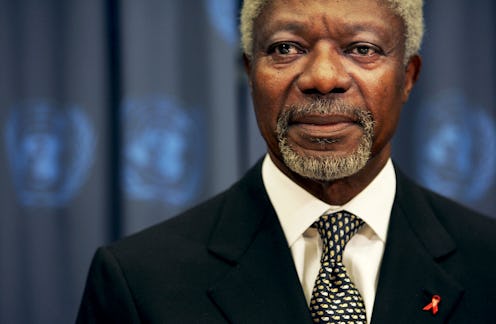News
Former UN Leader Kofi Annan, Who Championed Women's Rights For Decades, Has Died At 80

Nobel Peace Prize winner and former United Nations Secretary General Kofi Annan has died following a brief illness at age 80. Born in Ghana in 1938, Annan became the first black African to head the United Nations in 1997. His work as an international peacemaker in a time when threats of global terrorism were on the rise earned him the Nobel Peace Prize in 2001.
In a statement released Saturday, the Kofi Annan Foundation confirmed the humanitarian leader's death. "Kofi Annan was a global statesman and a deeply committed internationalist who fought throughout his life for a fairer and more peaceful world," the foundation said. "During his distinguished career and leadership of the United Nations he was an ardent champion of peace, sustainable development, human rights and the rule of law."
According to Reuters, Annan died following a brief illness in a hospital in Bern, Switzerland, with his wife and children by his side. The Kofi Annan Foundation did not disclose the details or name of the illness.
Although his decade-long tenure as head of the United Nations wasn't without criticism, Annan is largely credited with reforming the institution. When Annan and the United Nations were jointly awarded the Nobel Peace Prize in 2001, for example, the Nobel Committee lauded the leader for having brought "new life to the organization."
"While clearly underlining the U.N.'s traditional responsibility for peace and security, [Annan] has also emphasized its obligations with regard to human rights," the Nobel Committee wrote. "He has risen to such new challenges as HIV/AIDS and international terrorism, and brought about more efficient utilization of the U.N.'s modest resources. In an organization that can hardly become more than its members permit, he has made clear that sovereignty can not be a shield behind which member states conceal their violations."
The humanitarian was also known to be a global champion of women's rights. In 2005, he declared "there is no tool for development more effective than empowerment of women" while convening a session of the Commission on the Status of Women. He characterized women's empowerment as able to raise economic productivity, improve nutrition and HIV/AIDS prevention, increase education access, and prevent conflict and achieve reconciliation.
The New York Times also credits Annan with "crafting what he called a new 'norm of humanitarian intervention'" and with convincing the United States to finally pay the backlog of debt it owed to the intergovernmental organization. In his second term as U.N. secretary general, however, Annan would face increased challenges and criticism as the United States waged war on Iraq.
Still, as USA Today has reported, when Annan's tenure as secretary general ended in 2006 he left the United Nations "a global organization far more aggressively engaged in peacekeeping and fighting poverty." In many ways, Annan laid much of the framework for how the United Nations responds to humanitarian crises and promotes human rights and development around the world.
But Annan's humanitarianism and peacekeeping work continued after he stepped down as U.N. secretary general. He went on to found the Kofi Annan Foundation in 2007 in an effort to mobilize "political will to overcome threats to peace, development, and human rights." And in 2012 he was appointed joint U.N. and Arab League envoy to Syria.
"Wherever there was suffering or need, he reached out and touched many people with his deep compassion and empathy," the Kofi Annan Foundation said Saturday of its namesake. "He selflessly placed others first, radiating genuine kindness, warmth, and brilliance in all he did. He will be greatly missed by so many around the world."